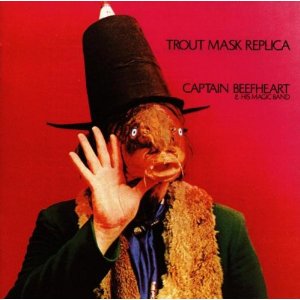
Don Van Vliet, better known as Captain Beefheart, was the very definition of rock music’s avant-garde. Drawing from primal Delta and Chicago blues, early R&B and experimental jazz, he fashioned a distinctive brand of non-mainstream rock that endeared him to Frank Zappa—with whom he often partnered—and made him one of rock’s most beloved cult heroes. His gruff, multi-octave vocals, surrealist songwriting and edgy, angular instrumental arrangements powered a band whose membership revolved but always aimed for rock’s outer limits creatively. Van Vliet died December 17 in Northern California at age 69. The cause, according to multiple news sources, was complications from multiple sclerosis.
Beefheart—Zappa has been credited with giving him his stage name although Van Vliet has said it was inspired by an oddball uncle who liked to expose himself—recorded only a dozen albums during the music stage of his career, which began to take shape seriously when he formed his first Magic Band in 1965 and released his debut album, Safe As Milk, in 1967. Subsequent recordings, notably 1969’s Trout Mask Replica and 1978’s Shiny Beast (Bat Chain Puller), were highly influential, admired by progressive and punk-rockers alike. Among those who’ve cited him as an influence are Tom Waits, Johnny Rotten and Sonic Youth. Beefheart’s contribution to music ended abruptly with 1982’s Ice Cream for Crow and in the years following his retirement from music Van Vliet became a prolific and much admired painter.
Born Don Glen Vliet in Glendale, Calif., on January 15, 1941, the future Beefheart became proficient on tenor and soprano saxophone, harmonica and other wind instruments. From the start, he operated outside of pop music’s established lines. An early promotional piece from his record company (reprinted in an obituary in The Washington Post ), reads: “A whirling dervish, honey of two white pigs bore snoots ’n touched tusks on either husk of the sun ’n moon/An apple dropped thru membrane arches broke embryonic picked out seed cores.”
Van Vliet attended high school with Zappa in Lancaster, Calif., and the two became close friends, writing songs together and forming a short-lived band. By 1966, Beefheart had signed to A&M Records, but that alliance lasted only a brief time. Buddah Records picked up Beefheart and the Magic Band and over their next few recordings the group solidified its mastery of quirky rhythms and uncategorizable songcraft, based on blues-rock but owing little to the genre’s conventions.
By any standards, Trout Mask Replica has gone down in history as one of the classics of rock’s fringe. Released on Zappa’s own Straight Records label, allegedly after eight months of torturous rehearsals by the band, the double album’s 28 songs were, according to Van Vliet, written in one eight-hour session on the piano, an instrument with which he had little familiarity. Zappa and Beefheart collaborated on several occasions throughout their lives—Beefheart’s voice can be heard on the track “Willie the Pimp” on Zappa’s 1969 Hot Rats album.
Captain Beefheart never achieved massive commercial success but he remained a giant among that faction of the rock audience—and fellow cutting-edge artists—that valued originality. Subsequent recordings such as 1970’s Lick My Decals Off, Baby and 1980’s Doc at the Radar Station elevated his profile among music fans that craved the idiosyncratic, and long after Don Van Vliet retired from music to concentrate on his love of the visual arts, his legion of admirers still wished for a comeback.


No Comments comments associated with this post